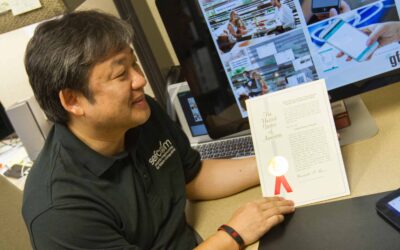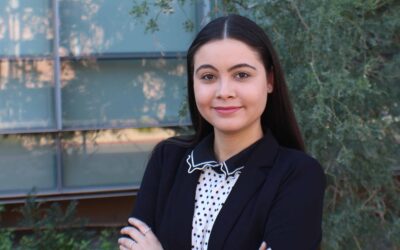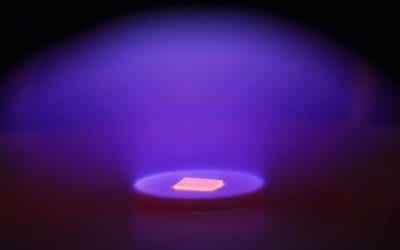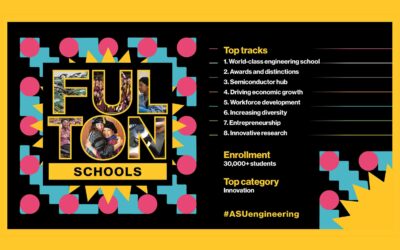ASU to advance proposal for CHIPS and Science Act funding
Regionally collaborative proposal to advance microelectronics research, development and manufacturing in Southwest as part of national network
March 15, 2022
This story originally appeared in ASU News.

Responsive to action initiated by the Department of Defense, Arizona State University President Michael Crow has appointed two senior leaders to guide the university in creating a world-class center of excellence for microelectronics research, development education and training.
Sally Morton, executive vice president of ASU’s Knowledge Enterprise, and Kyle Squires, dean of the Ira A. Fulton Schools of Engineering, will lead an interdisciplinary team composed of ASU faculty, staff and strategic external partners to respond to the Department of Defense’s call for proposals to establish the Microelectronics Commons — a national network funded by the CHIPS and Science Act of 2022.
“Arizona State University is a national service university, built to accelerate positive outcomes through the integration of cutting-edge technological innovation and to be responsive in moments like this that call upon us to work collaboratively to pursue goals in the vital interest of our country,” ASU President Michael Crow said.
“Under the leadership of Dr. Morton and Dr. Squires and in partnership with colleagues in the private sector, ASU will offer a strategic proposal to the U.S. Department of Defense to create and operate a Microelectronics Commons that drives a coordinated process of innovation at scale and helps the United States succeed in being the global leader in microchip research, development and manufacturing,” Crow said.
The CHIPS and Science Act includes $2 billion for DOD to establish the Microelectronics Commons, which aims to close the innovation “lab-to-fab” capabilities gap in the United States. By building enduring partnerships across emerging technology research and development, manufacturing and government stakeholders at all levels, the Microelectronics Commons will work to scale the semiconductor technologies necessary for the U.S. national security enterprise, and develop the skilled American workforce needed for this essential sector.
The DOD released a Request for Solutions on Nov. 29; responses are due on Feb. 28, 2023.
ASU is at the center of Arizona’s rapidly growing identity as a global semiconductor hub. Two of the world’s largest semiconductor firms — Intel and TSMC — have announced three megaprojects now totaling $72 billion that will build new or expand existing semiconductor fabrication facilities in the Phoenix area; and Apple recently announced it would begin buying its microchips in Arizona starting in 2024.
The microelectronics industry directly employs 22,000 people in Arizona, and the state’s broader semiconductor supply chain ecosystem includes leading equipment manufacturers, chemicals and materials suppliers, semiconductor packaging firms and defense electronics companies.
Drawing on the region’s strengths, ASU’s proposal will prioritize connecting students, researchers and designers at universities and companies throughout the region with prototyping capabilities, advancing the model established by ASU’s MacroTechnology Works facilities. Building on ASU’s existing partners, the university intends to collaborate with new partners to help the Department of Defense bridge the microelectronics technological “Valley of Death,” and expand domestic microelectronics innovation and manufacturing.
“Success will be driven by partnerships and collaboration,” Morton said. “The university is working with existing partners and seeking to develop new relationships to build the collective team needed to accomplish the tasks ahead and to partner in not only manufacturing, but in the continued innovation of research and development.”
“ASU has been working toward this goal for more than two years,” Squires said. “We have had input into the process that created the CHIPS and Science Act legislation and we have prepared to be a contributor and higher education and research partner as this unique opportunity has come into sharper focus.”
Arizona U.S. Sen. Mark Kelly, who was instrumental in tailoring the CHIPS and Science Act and building a coalition of support to pass the bill, has worked closely with Arizona business groups, industry and ASU to put the state in position to play a role in this national economic development and national defense priority.
“After nearly two years of work to secure funding for the Department of Defense’s National Network for Microelectronics Research and Development within the CHIPS Act, I’m excited to see this program take shape,” Kelly said. “This program will foster partnerships between universities and industry to establish new capabilities allowing American researchers, entrepreneurs and our armed forces to develop and test new microchip technologies in the United States, not in China.
“ASU has the advanced capabilities needed to make a real impact on the network; I applaud them for their ongoing determination to stay on the cutting edge of such an important mission for our national security and economy.”
Ranked No. 1 in innovation for eight consecutive years by U.S. News & World Report, Arizona State University is home to the largest engineering college in the country, with more than 30,000 students enrolled in seven transdisciplinary engineering schools, including the new School of Manufacturing Systems and Networks. More than 500 faculty members teach on campus and online with more than $150 million in engineering research expenditures in 2022.
Driven by its mission of public service and accelerated by the renewed national focus on domestic chip production, ASU leverages its diverse capabilities, industry-grade facilities, expertise and partnerships to bolster microelectronics research, development and manufacturing at a national scale.
Fulton
Researcher
Kyle Squires
Senior Vice Provost for Engineering, Computing and Technology;
Vice Provost of the Polytechnic Campus
Arizona State University
Dean and Professor
Ira A. Fulton Schools of Engineering
Related Stories
Gail-Joon Ahn named IEEE Fellow
Innovations to advance information and systems security earn Professor Gail-Joon Ahn highest member status in leading electrical engineering organization
Growing social good
Industrial Engineering graduate student Xaimarie Hernandez Cruz one of 2 at ASU and 25 nationally who received the prestigious award
ASU researchers use diamonds for electrical power
Professor Trevor Thornton leads research through ASU’s AMPED Science and Technology Center to create diamond and boron nitride transistors
Fulton Schools Wrapped: 2022 year in review
Revisit some of the year’s most impactful achievements published on our engineering news blog, Full Circle, and ASU News



